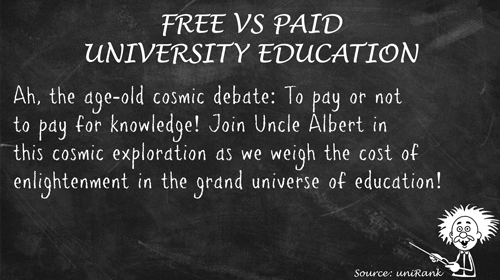 Is free University a good idea? Does free college work? Should higher education be free to all?
These are a few questions students, academics and governments around the world have been asking to a great extent.
Is free University a good idea? Does free college work? Should higher education be free to all?
These are a few questions students, academics and governments around the world have been asking to a great extent. The debate on whether higher education should be free or paid has in fact been ongoing for many years. There are different political, socio-economic and academic views on this subject, with some people believing that higher education should be free, while others think it should be paid.
uniRank will try to give a balanced view, showing both sides of the argument and explore some of the most important advantages and disadvantages of free and paid higher education which has been debated for a long time.
Advantages of Free Higher Education
AccessibilityFree higher education provides equal opportunities for all individuals regardless of their socioeconomic status. Students from low-income families or marginalized communities who may not have the means to pay for education can have access to higher education, which can help to bridge the inequality gap.
Economic Growth
Free higher education can lead to a more educated and skilled workforce, which can in turn boost economic growth and development. This is because an educated workforce can contribute to the creation of more jobs, innovations and entrepreneurship.
Social Mobility
Free higher education can provide opportunities for social mobility. People from disadvantaged backgrounds can obtain higher education, which can help them to improve their social and economic status. This can also reduce the poverty level in society and help to bridge the inequality gap.
Reduced Student Debt
Free higher education can help to reduce the student debt burden. Students who do not have to pay for tuition fees can focus on their studies and graduate without the stress of student loans. This can also enable them to have more financial freedom and security after graduation.
Disadvantages of Free Higher Education
Financial BurdenFree higher education can be a financial burden for the government. The government has to provide funds for free higher education, which can be a significant cost. This can lead to a reduction in funds for other important areas of the economy such as healthcare, infrastructure and defense.
Quality of Education
Free higher education can lead to a decline in the quality of education. This is because the government may not be able to provide the same level of funding and resources as paid institutions. As a result, the quality of education may be compromised, leading to a decline in the value of a degree.
Motivation
Free higher education can reduce motivation among students. Students who do not have to pay for tuition fees may not take their education seriously, leading to a decline in academic performance and graduation rates.
Increased Competition
Free higher education can lead to increased competition for limited spaces in institutions. This can result in more students applying to institutions than they can accommodate, leading to a decline in the quality of education.
Advantages of Paid Higher Education
Quality of EducationPaid higher education can provide better quality education. This is because paid institutions are often better funded and have access to more resources, which can lead to better facilities, more experienced faculty and more diverse course offerings.
Motivation
Students who pay for their education may be more motivated to succeed, as they have invested a significant amount of money in their education. This can lead to higher graduation rates and better academic performance.
Access to Resources
Paid higher education provides access to resources such as libraries, laboratories and other facilities, which can help to enhance the learning experience. These resources may not be available in free institutions.
Career Prospects
Paid higher education can provide better career prospects. This is because paid institutions are often more prestigious and have a better reputation, which can help to enhance job prospects.
Disadvantages of Paid Higher Education
Financial BurdenPaid higher education can be a financial burden for students and their families. The cost of tuition fees can be a significant barrier for some students, leading to a decline in the number of students who can access higher education.
Inequality
Paid higher education can lead to inequality. Students from low-income families or marginalized communities may not have the means to pay for their higher education.
Exclusivity
Paid higher education may be more exclusive, as the cost of tuition can limit access to education for certain groups of people. This can perpetuate social and economic inequality.
Student Debt
Students who pay for their education may be burdened with significant amounts of student debt after graduation. This debt can take years or even decades to pay off and can limit financial freedom and opportunities after graduation.
Pressure to Succeed
The cost of tuition fees can create pressure for students to succeed academically and financially. This pressure can be stressful and overwhelming and may lead to mental health issues.
Conclusion
In conclusion, there are advantages and disadvantages to both free and paid higher education.Free higher education provides accessibility, economic growth, social mobility and reduced student debt, but can also create a financial burden for the government, reduce the quality of education, reduce motivation and create increased competition.
Paid higher education provides quality education, motivation, access to resources and better career prospects but can also create a financial burden for students and their families, perpetuate inequality, burden students with debt and create pressure to succeed.
Ultimately, the decision on whether higher education should be free or paid will depend on a range of factors, including the economic and social context, the values and priorities of society and the available resources. © uniRank
